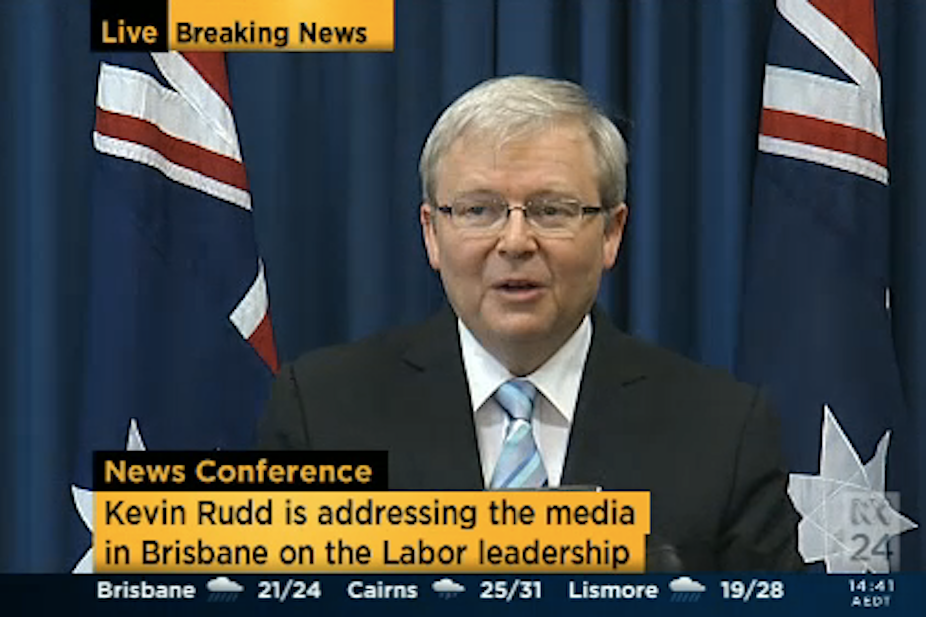Kevin Rudd has formally announced he will contest the Labor leadership in a ballot on Monday. This is just the latest act in the pantomime of Australian politics.
This drama production is an indulgence and in it we see how the ALP has rediscovered the traditional roots of all politics: dishonesty, deceit, fear, anger, lust and revenge. It is worth remembering the words of the American academic and historian, Henry Brooks Adams – “politics, as a practice, whatever its professions, has always been the systematic organisation of hatreds.”
In sum, there is nothing wrong or unnatural in the unfolding stage-managed squabble between Prime Minister Julia Gillard and former Prime Minister Kevin Rudd. But what is surprising is the almost total lack of wider reflection upon it.
The candidates’ contending histories of how it all came to pass are virtually irrelevant because of the public’s inability to independently verify the respective accounts (assuming they even want to).
Still, futile attempts will be made by Gillard and Rudd to promote their version of events, even though it will convince only those whose loyalties were pre-existing.
So beyond personal accounts, what might be observed that has a bearing on the outcomes, or at least should have?
The first, is that Prime Minister Julia Gillard presents herself as someone to whom things happen – she is never part of their provenance. Thus, she never conspired against Rudd, others came to her at the last minute.
We see this again and again. When the ABC’s 4 Corners program provided accounts that an ascension speech had been written some time in advance of Prime Minister Rudd being deposed, this was an initiative undertaken by her office, without her knowledge.
In the same vein, her office was responsible for the Australia Day fiasco. And lastly depending on how you view the custody of media in Gillard’s immediate circle, her office, or someone close to it, might even have been responsible for the leaked Rudd YouTube video.

In other words, even if the last-mentioned event is discounted, the inference is that the prime minister is frequently a lever jerked by those who control the machine.
Second, her leadership is meant to be strong – strong enough to provide the political leadership for the country, to lead the ALP, control caucus, and manage cabinet. This is her claim and the claim made on her behalf by her supporters, especially among the upper echelons of cabinet.
Yet as deputy prime minister, she and any aggregation of senior ALP cabinet members, were never strong enough, courageous enough, or imaginative enough to call a meeting with Rudd to tell him that his leadership style was unacceptable.
I would expect that, over time there could have been at least 2-3 such meetings which could have escalated to the point where he should have been given an ultimatum if that was their inclination.
Instead, they seemed to have had only the courage to moan and groan about him and then mount a gang attack on a person who was not only just being himself, but the party’s democratically elected prime minister in his first term.
Third, whatever Rudd’s failings as prime minister, they were surely known from as early as his time in the Queensland State government apparatus, and certainly no later than during his time in opposition in Canberra.
Finally, all this talk about teamwork and personal relationships strikes me as a little weak and thin-skinned. Cabinets are not sports teams and this misunderstanding has become far too popular on all sides of politics. Members of political parties do not have to like each other. They do have to find ways of developing and implementing sound policies. It is a fallacy that totally ignores the history of, for example, effective but divided wartime cabinets and general staffs.
Citizens should not give a damn whether the relationships are close or bitter, but they should care whether a shared vision, albeit moderated by diverse backgrounds, can be pursued. If the ALP cabinet is saying that Rudd is impossible, period, then they, collectively, are poor excuses for politicians.
Overall, there is a strange and curious implication to all of this: the treatment of Kevin Rudd – in particular what appears to be the collective failure to confront him – paradoxically makes him an ideal leader for the times.
To borrow from the late Dr. Hunter S. Thompson, the ALP is currently demonstrating little more than its indomitable “will to lose”, but Rudd probably could change that. It will be one hell of a ride and he won’t score as high on a “buddy rating” as many of the mediocrities national politics attracts, but he is, to borrow again from Hunter S., full of “dissatisfied voltage.”

